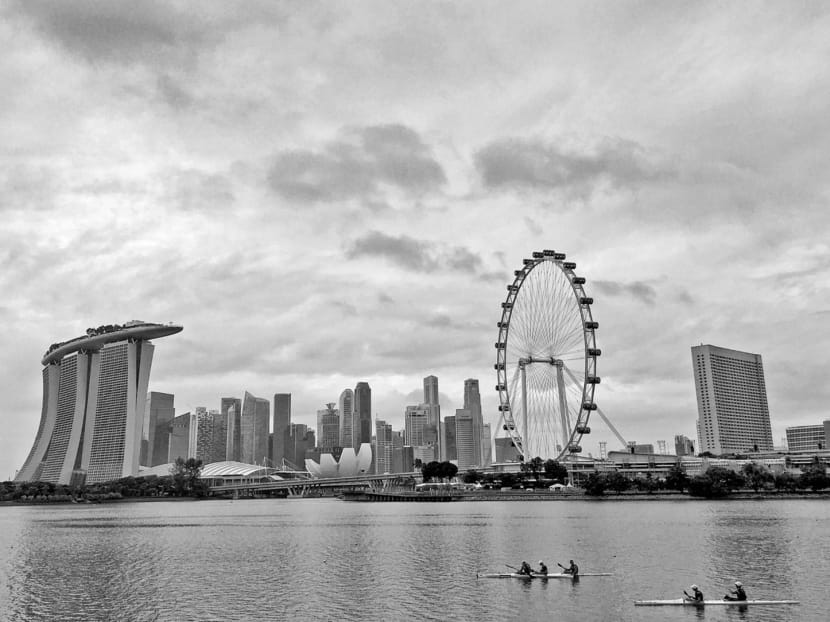Economy of the future must build on Singapore’s identity
With Singapore’s economic outlook looking uncertain, many of us eagerly await the report by the Committee for the Future Economy. The CFE, chaired by Minister for Finance Heng Swee Keat and Minister for Trade and Industry (Industry) S Iswaran, has tapped the expertise of industry leaders across business sectors to “identify areas of growth with regard to regional and global developments”.

Singapore’s competitive advantage does not lie only in the skills it provides employers but also in its diversity and rich history. PHOTO: AP
With Singapore’s economic outlook looking uncertain, many of us eagerly await the report by the Committee for the Future Economy. The CFE, chaired by Minister for Finance Heng Swee Keat and Minister for Trade and Industry (Industry) S Iswaran, has tapped the expertise of industry leaders across business sectors to “identify areas of growth with regard to regional and global developments”.
The committee’s recommendations are expected to help shape the Ministry of Finance’s labour and skills development strategy over the next few years.
The CFE, however, convenes only prominent business trade leaders, leaving traditional “thinkers” of the economy, such as academics, on the sidelines. There are no economists, sociologists, anthropologists or historians on the committee, and think-tanks such as the Civil Service College and the National University of Singapore at most play only a supporting role to this important recommendation.
The future economy ostensibly requires insights into business practices and emerging trends of companies ranging from large-scale MNCs to smaller enterprises.
However, the considerations of the future economy also hit us at a time when we are repositioning ourselves for a post-SG50 Singapore.
A post-SG50 Singapore is one that requires us to build what Ambassador-at-Large Tommy Koh calls “cultural confidence”, having the pride in who we are and what we can do as a nation. After decades of growth led by big business, the Government has very rightly pivoted our next phase of economic growth towards local entrepreneurship.
But entrepreneurship goes beyond finding the next billion-dollar start-up idea. It is also about utilising local expertise and cultural context to create an economy that builds our social identity as Singaporeans — be it the use of Singlish in products, celebration of our multiculturalism in novel ways, or even questioning at a deep level what it means to be “Singaporean” in times of xenophobic tension.
An economy that does not actively build around the social fabric that binds people together is nothing but a machine, and the future economy will succeed only if it helps us figure what living a “good life” will mean for Singaporeans. Economic development for its own sake is pointless.
The focus on “skills” and competencies is thus necessary, but insufficient. Given the high expectations on the CFE in “transforming” Singapore, we have to guard against letting the discourse on skills eclipse the needs of a maturing society.
Navigating technological disruption with increasing strains on society calls on us to nurture the critical skill of empathy, actualised through a deep-rooted appreciation of history and diversity. Empathy is a skill that few workshops can nurture, but the inability to listen causes fractures in society.
Beyond having conversations around race and religion, urban planners should listen more closely to environmentalists, scholars must listen more closely to heartlanders, and youth should take heed of the life lessons of seniors.
Technical skills are important, but an over-emphasis on “skills” risks creating a future of the past, based on an industrial model of economy and employment. In this ostensibly post-industrial climate, cultural confidence will forge our future as local heritage becomes material for entrepreneurship and create an economy that is relatable to all.
Knowing history and building empathy not only make us more socially aware, they also complement the workplace by creating more productive workers that are more attuned to the needs of fellow citizens. A confident, resilient and productive future can be created only when diverse viewpoints rooted in deep empathy create robust recommendations for the kind of society (and not just the kind of economy) that we want to be.
In the interest of securing Singapore’s future, it may be timely to form a Committee on Cultural Confidence, which would study closely the deepening concerns around racism, religiosity, nationalism and belonging, and how best to ensure Singapore continues to develop as a fair, just and secular society, where its residents truly feel respected, included and wanted, not just as cogs in the economic machine.
The committee should include a broad spectrum of leaders and thinkers across various disciplines and identities, examine strategies of mitigating deepening fault lines and look towards practices instituted around the world that aim to create a more harmonious and determined society.
Such comprehensive educational practices are already seen in other developed economies, such as the Step by Step programme in Denmark, where students learn to sense, recognise and respect their own and others’ feelings through a mandatory empathy curriculum delivered from as early as pre-school.
As we prepare for the future economy post-SG50, it will be a mistake to think that upgrading skills is the silver bullet to our next phase of growth.
Investing in our culture is equally important, for therein lies the strength of our social fabric and the foundation for creating a resilient society for generations to come.
Our cosmopolitan city’s competitive advantage does not solely lie in the skills we provide to the world’s employers.
We offer our diversity, our rich history as an experiment in multiculturalism and our unique idiosyncrasies.
ABOUT THE AUTHOR:
Benjamin Goh is a Master in Public Policy candidate at the John F. Kennedy School of Government, Harvard University.






